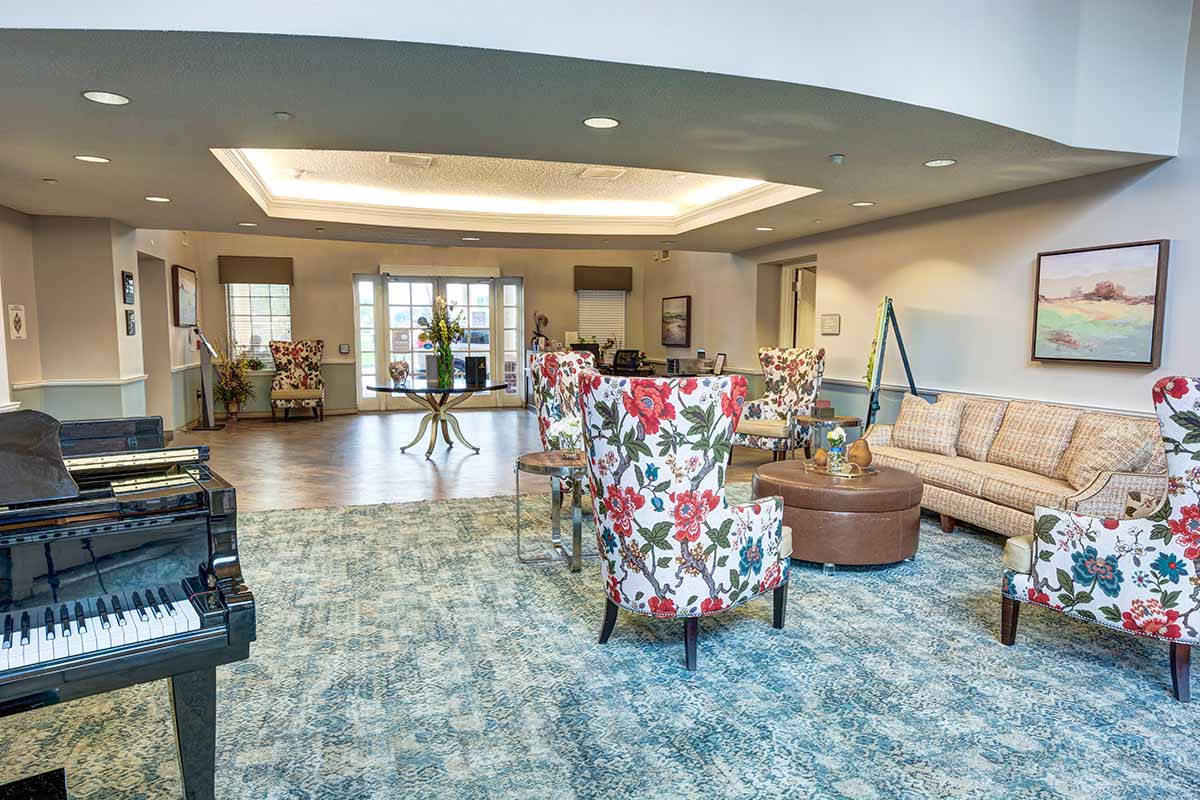The Impact of Personalized Memory Care on Brain Function
The Impact of Personalized Memory Care on Brain Function
Blog Article
Exploring the Value of Memory Care Provider in Small Memory Care Residences
Memory treatment solutions play an important function in boosting the lives of people with cognitive problems. In tiny memory care homes, the emphasis shifts to customized treatment customized per resident's one-of-a-kind needs. These intimate setups promote deeper links and an encouraging area. However, the question continues to be: how do these environments particularly add to the emotional health of both locals and their households? Comprehending this dynamic discloses real worth of specialized memory care.
Comprehending Memory Treatment and Its Importance
Memory care is an essential part in addressing the unique needs of people with cognitive problems, such as mental deterioration and Alzheimer's illness. This specialized form of care concentrates on creating a helpful and safe setting customized to the obstacles dealt with by these people. Memory treatment centers use qualified personnel that understand the intricacies of cognitive decline, using personalized care that advertises dignity and routines and respect.activities are designed to stimulate memory retention and cognitive function while making certain security and security. Additionally, memory care emphasizes social communication, which can relieve feelings of seclusion and boost emotional wellness. By fostering a structured environment, people can navigate their day-to-days live with more self-confidence. Understanding the significance of memory care exposes its function in improving lifestyle, enabling people to preserve as much independence as possible while getting the support they need.

The Advantages of Smaller Sized Memory Care Residences
Smaller memory treatment homes offer an even more intimate setup that can significantly enhance the quality of take care of citizens. With fewer homeowners, team member can develop more powerful connections, fostering count on and psychological links. This personalized attention commonly causes boosted interaction, making it simpler for caretakers to understand and fulfill the distinct demands of each local. Furthermore, smaller atmospheres typically lower interruptions and stressors, promoting a calming ambience for memory retention and emotional well-being. The format of smaller homes frequently encourages socializing amongst locals, allowing for purposeful interactions that can fight feelings of isolation. Furthermore, these homes can adjust more quickly to changes in treatment demands, making sure that residents obtain prompt assistance. Generally, the individualized interest, reduced tension, and improved social opportunities located in smaller sized memory treatment homes produce a caring atmosphere that supports both cognitive feature and psychological health
Personalized Care Plans for Individual Needs
Personalized care strategies are vital in resolving the unique requirements of individuals in memory treatment. These plans commonly consist of customized assistance strategies that enhance daily living and promote well-being. Furthermore, personalized activity involvement aids residents get in touch with their passions, fostering a feeling of purpose and pleasure.
Tailored Assistance Strategies
When developing customized support approaches in memory care solutions, recognizing the distinct requirements of each individual is essential. These strategies involve creating individualized treatment plans that deal with the details demands, choices, and capabilities of residents. By assessing cognitive feature, emotional health, and physical health, caregivers can make efficient interventions that advertise convenience and freedom - small memory carehomes Charlotte. This individualized approach guarantees that each citizen obtains ideal support, boosting their lifestyle. Routine analyses and changes to these strategies are essential, as they allow caregivers to respond proactively to transforming needs. Additionally, engaging relative in the planning procedure fosters a joint environment, reinforcing the support network for people with memory difficulties. Ultimately, tailored assistance strategies are important for delivering caring and effective memory care
Individualized Task Involvement
Producing significant interaction with individualized tasks is essential in memory treatment services. Memory treatment homes focus on individualized treatment plans that deal with the special needs and preferences of each resident. These plans often consist of activities tailored to homeowners' rate of interests, capabilities, and cognitive levels, boosting their sense of objective and dignity. By including familiar routines, pastimes, and social communications, caretakers can boost cognitive feature and psychological health. Customized activity engagement not only cultivates a helpful atmosphere yet likewise motivates homeowners to preserve their self-reliance. The energetic involvement in these customized activities can lead to improved mood and reduced stress and anxiety, reinforcing the relevance of a holistic strategy in memory treatment that identifies each individual's trip and one-of-a-kind experiences.
Developing a Supportive Area Atmosphere
While promoting see this a supportive area atmosphere is vital for those with memory treatment requirements, it needs intentional design and thoughtful engagement. Producing such a setting includes a combination of physical room and interpersonal connections. Small memory treatment homes can benefit significantly from designs that motivate social interaction, such as open common locations and cozy event areas. These designs promote a sense of belonging and protection for residents.Moreover, personnel members play a vital duty in cultivating this setting. Training caregivers to focus on empathy and energetic listening improves connections and fosters trust fund. In addition, involving family members in treatment plans and area activities can enhance bonds and develop a network of support.
Enhancing Social Engagement and Tasks
Effective social engagement and tasks are important for enhancing the health of locals in memory care homes. These interactions not just cultivate a sense of belonging however likewise promote cognitive functions, which can positively influence memory retention. Small memory treatment homes typically give personalized programs tailored to the special interests and abilities of each local, permitting more meaningful and reliable engagement.Activities such as art therapy, songs sessions, and group games motivate locals to connect with each other, promoting relationships and lowering feelings of isolation. In addition, including outdoor tasks, such as gardening or nature walks, can enhance state of mind and total health.These enhancing experiences assist citizens keep a feeling of purpose and happiness in their lives. By developing an environment that prioritizes social communication, tiny memory treatment homes significantly add to the emotional and psychological well-being of their see it here citizens, guaranteeing they feel valued and sustained in their journey.
Sustaining Family Members Through the Trip
As family members navigate the challenges of taking care of an enjoyed one with memory problems, the assistance supplied by little memory treatment homes becomes vital. small memory carehomes Charlotte. These homes provide not just specialized treatment for homeowners but also valuable resources for households. By fostering a collective environment, small memory treatment homes motivate open interaction, enabling families to share concerns and share experiences.Support teams and academic workshops are frequently available, furnishing families with expertise and approaches to handle the intricacies of memory go to the website loss. Such efforts help in reducing feelings of isolation, as family members attach with others encountering comparable situations.Moreover, small memory care homes usually provide personalized updates on residents' well-being, reducing family members' fears and aiding them feel entailed in their loved one's day-to-day live. This all natural method to sustain not just improves the quality of take care of locals however additionally empowers family members throughout their psychological journey
The Influence of Specialized Team Educating on Treatment Quality
In little memory care homes, the quality of care is profoundly influenced by the training and experience of the team. Specialized training furnishes caretakers with crucial abilities to comprehend and resolve the distinct requirements of locals with memory impairments. Expertise of dementia-related behaviors, efficient interaction strategies, and person-centered treatment strategies improves the ability of staff to create a helpful environment.Moreover, trained staff are much better prepared to manage difficult circumstances, decreasing the possibility of problems and ensuring a calmer atmosphere. This training promotes a much deeper emotional connection between caregivers and homeowners, promoting count on and improving overall wellness. Furthermore, specialized training can bring about greater task complete satisfaction among caregivers, decreasing turn over rates and offering continuity of look after citizens. Inevitably, the investment in staff education markedly raises the criterion of care, which is vital for enhancing the quality of life for individuals in little memory treatment homes.

Regularly Asked Inquiries
Just how Do I Pick the Right Memory Care Home for My Liked One?
Choosing the ideal memory treatment home entails evaluating individual requirements, going to centers, evaluating personnel experience, understanding care options, taking into consideration area, contrasting costs, and looking for recommendations. Each factor plays an important duty in making sure optimal treatment.
What Is the Cost Distinction Between Large and tiny Memory Care Facilities?
The expense difference between tiny and big memory care centers can differ substantially. Generally, small homes may offer even more tailored treatment at a higher per-person price, while bigger centers commonly give a lot more amenities at a reduced overall expense.
How Commonly Can Family Members Check Out Their Loved Ones in Memory Care Houses?
Family members can typically visit their loved ones in memory treatment homes as usually as desired, with numerous facilities motivating regular sees to maintain links and support psychological wellness, though details policies might vary by home.
What Details Tasks Are Used in Little Memory Care Residences?
Small memory treatment homes usually use tasks like arts and crafts, songs therapy, gardening, workout courses, and cognitive games. These tasks are made to engage citizens, stimulate their minds, and advertise social communication among them.
Exist Any Type Of Age Limitations for Citizens in Memory Care Facilities?
Age limitations for citizens in memory care centers commonly differ by location and individual center policies. Normally, these homes accommodate older grownups, commonly calling for citizens to be a minimum of 55 or 60 years old. In tiny memory treatment homes, the focus changes to personalized treatment customized to each resident's distinct demands. Memory care facilities use experienced staff who comprehend the complexities of cognitive decrease, using individualized care that advertises dignity and regimens and respect.activities are created to promote memory retention and cognitive feature while making sure safety and protection. Smaller memory care homes use a more intimate setting that can noticeably boost the quality of care for locals. Memory treatment homes focus on individualized treatment strategies that cater to the unique needs and choices of each homeowner. As families navigate the difficulties of caring for an enjoyed one with memory disability, the assistance provided by small memory care homes becomes vital.
Report this page